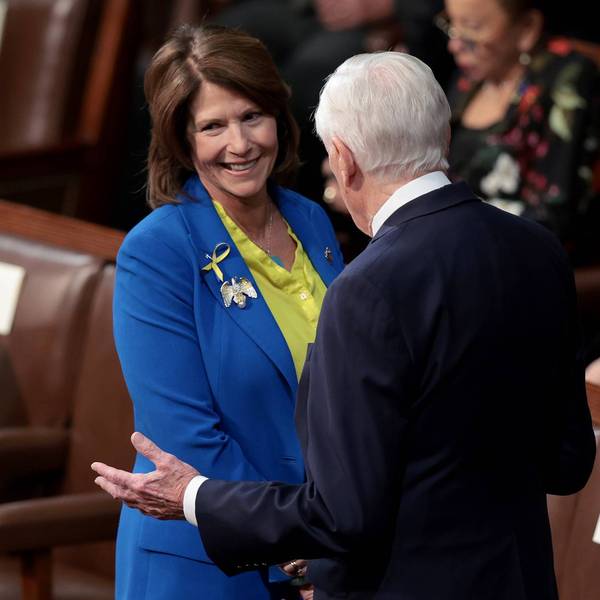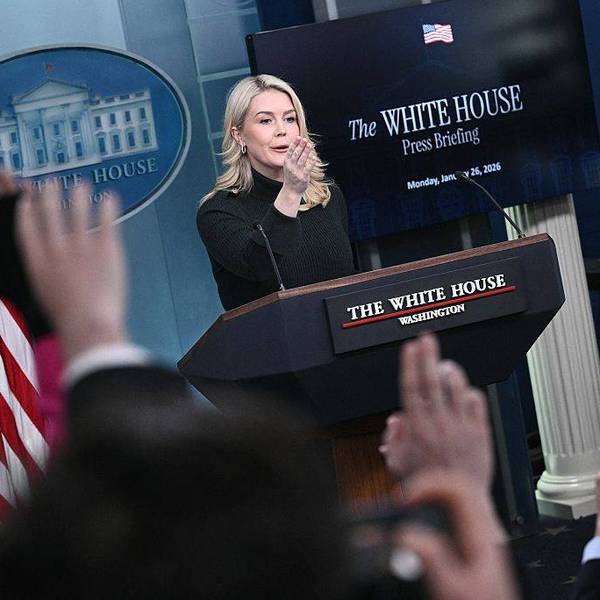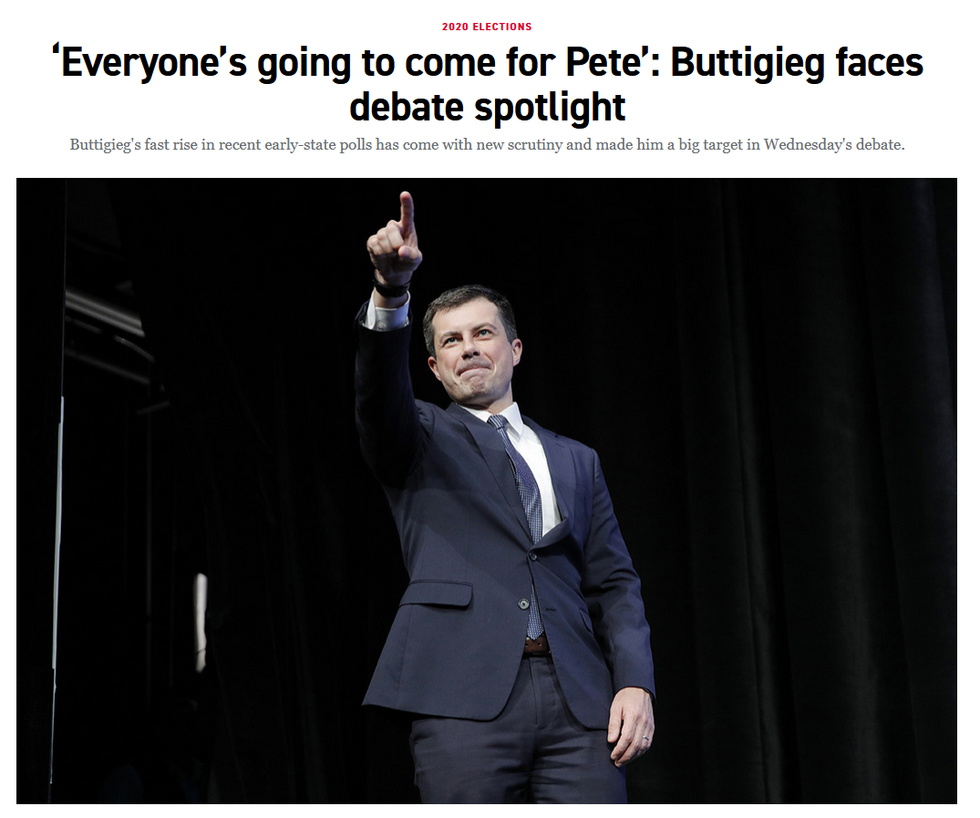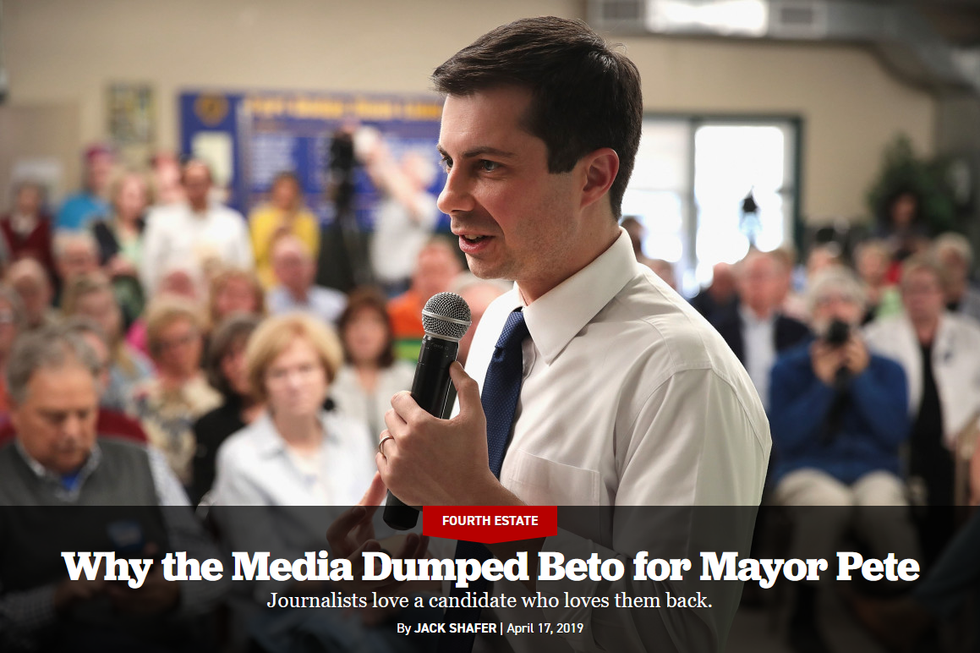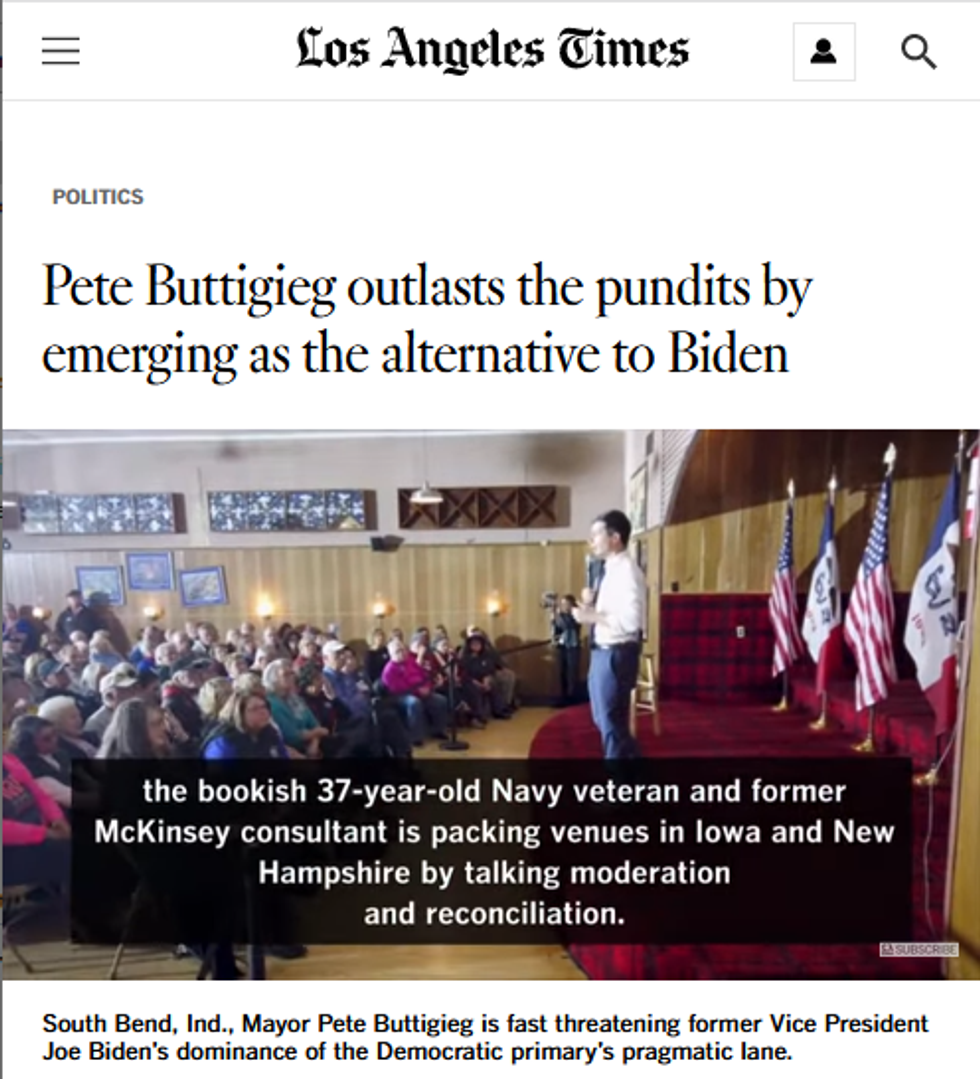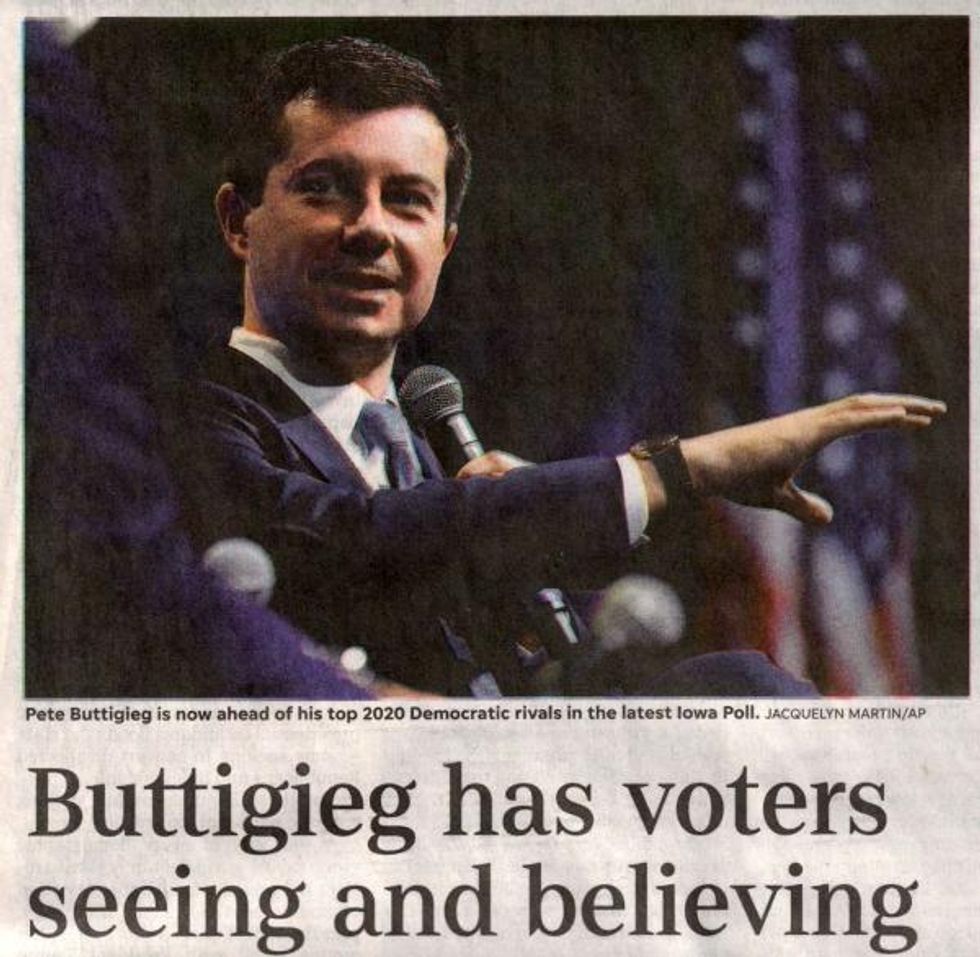After polling averages showed him as a frontrunner in the Iowa and New Hampshire Democratic nomination contests, journalists predicted South Bend, Indiana, mayor, presidential candidate and "media darling" Pete Buttigieg would be in the hot seat at last month's MSNBC/Washington Post debate in Atlanta.

"'Everyone's Going to Come for Pete': Buttigieg Faces Debate Spotlight," declared Politico (11/19/19), claiming the candidate's "fast rise in recent early-state polls has come with new scrutiny and made him a big target." Besides the "surge" that made him "a serious threat to the top Democratic presidential candidates" (and thus "makes the debate a serious threat for him"), there had just been what Politico described as a "dust-up": Buttigieg, whose support among African Americans nationally was, as recently as August, roughly 0% (and who had quite possibly leaked a memo putting that down to black people's homophobia), had been promoting his "Douglass Plan for Black America" in materials that deceptively implied the endorsement of hundreds of black South Carolinians. All three of the prominent leaders named at the top of one press release (Intercept, 11/15/19) said they were misrepresented.
But despite having a black moderator, and being in a majority-black city, the MSNBC/Washington Post debate only directed a single vaguely worded question about "Mayor Pete Buttigieg's outreach to African-American voters" to Kamala Harris, with Buttigieg never being directly asked about the Intercept's report that his campaign fabricated endorsements from prominent black leaders in South Carolina.
The alleged "Buttigieg boom" may now be crumbling under the candidate's stubborn opacity around his funders and great swaths of his career, as well as the entry into the field of fellow smug centrist Michael Bloomberg. Such as it was, the phenomenon was based largely on two small, white states early in the primary process; Buttigieg showed few signs of breaking out of 4th place--either nationally, or in the larger and more diverse states, like California, that are more representative of the Democratic electorate.
But corporate media have a practice of outsizing the attractiveness and viability of centrist candidates, including shielding them from critical examination (FAIR.org, 7/3/19).
Before suggesting his early wins might put him in their crosshairs, Politico's Jack Shafer (4/17/19) had explained media's coddling of Buttigieg's candidacy by relating it to the favorable treatment of corporate media's "previous political shooting star," former presidential candidate Beto O'Rourke. "Why the Media Dumped Beto for Mayor Pete" offered a self-conscious list of press-attracting qualities: "plays a decent piano," "once gave a TEDx talk," "an old person's idea of what a young person should be like." The press corps'
transition to Buttigieg has been seamless, finding in him another candidate who speaks complete sentences, who likes the camera almost as much as it likes him, who subscribes to the usual Democratic articles of faith and scans like a lost episode of The West Wing....
Finally, whenever national political reporters look at the ambitious, conspicuously educated, ticket-punching, aggressively tame candidate Buttigieg, they can't help but see themselves. Think of their coverage as modest self-assessments.
Savvy enough. However, as FAIR (Extra!, 10/89) has long documented, and as Politico founding editor John Harris (11/7/19) recently admitted, the
pervasive force shaping coverage of Washington and elections is what might be thought of as centrist bias, flowing from reporters and sources alike.
In other words, when Politico admits that national political reporters "see themselves" when they look at Buttigieg--who has, e.g., flip-flopped to attack Medicare for All because it would remove "choice," and more importantly would hurt the profits of the for-profit healthcare industry that is increasingly bankrolling his campaign--we should keep in mind that this identification includes, along with his piano-playing, his status quo, top-down corporate politics on issues from austerity to foreign policy, and his ability to sell this anti-change paradigm while sounding like a visionary.
The emphasis on Buttigieg's persona at the expense of his policies (to the extent he has actually proposed any) is hardly unique to Politico's report. It dovetails neatly with the denatured horserace coverage corporate media love so much, that often portrays a lack of voter support as an obstacle to their preferred centrists' ascent, rather than evidence of a problem with the centrists for not supporting a progressive political agenda representative of most voters. And then, to the extent these media outlets focus on issues, they often reverse reality by describing politicians who do support popular progressive policies as "divisive," "unelectable" or "unrealistic" (FAIR.org, 7/2/19, 7/30/19, 10/25/19).
The Los Angeles Times (11/10/19) reassured readers that, with "many Democrats growing anxious that an uncompromising progressive at the top of the ticket could push swing states into President Trump's hands," Buttigieg is talking "moderation and reconciliation."
A report on the "37-year-old wonderboy" by CNN's Chris Cillizza (11/12/19) focused vapidly on whether Buttigieg can "sustain his momentum," and what "could possibly rain on the Pete parade," while offering no analysis of what policies Buttigieg actually supports.
Time's profile, "Mayor Pete's Unlikely, Untested, Unprecedented Presidential Campaign" (5/2/19), openly admitted that Buttigieg's campaign "is more about who he is" and "what he represents" than "what he'll do if he's president," given that "unlike many of his opponents, he hasn't posted any detailed policy proposals on his website." Time noted that "winning voters of color may be difficult," supposedly because Buttigieg is a "white guy" running against "black senators," and other white guys like Joe Biden who have "long-standing relationships in black communities"--not because his mayoral record and presidential campaign suggest that he doesn't value people of color or what they want.
Politico (11/19/19) presented Buttigieg's "failure to gain traction" with black people as primarily a potential weapon for his opponents, who might "link" it to his electability. Bloomberg's report, "Pete Buttigieg Embraces Top-Tier Status With New Message of Unity" (11/5/19), similarly described "his lack of support among black voters" as "a significant hurdle for Buttigieg"--framing voters' lack of interest as an obstacle to a politicians' ambitions, rather than as an expression of democratic preference.
Meanwhile, the Wall Street Journal (11/11/19) declared that the "hottest Democratic presidential candidate right now is Pete Buttigieg," and suggested that because people believe mayors can't hide "from either problems or their own decisions," that relatively small-arena experience could "be more political asset than liability." The New York Times' "Pete Buttigieg Tests 230 Years of History: Why Can't a Mayor Be President?" (11/18/19) echoed the Journal by daringly speculating that the "vagueness" of being a mayor of a "less well-known" place like South Bend "may be an asset" in overcoming the fact that Americans have "never elected a sitting mayor to the presidency."
USA Today's "Rising Star? Seven Hurdles Facing Democrat Pete Buttigieg's 2020 Presidential Campaign" (4/14/19) listed among these "Running as a White Male," as if belonging to the same demographic group as 33 out of 35 previous nominees was a particular hardship. Not considered such a "hurdle": his lack of support for a Green New Deal, Medicare for All, free college or taxing the wealthy, despite all these policies being popular with voters, particularly Democratic ones (In These Times, 11/15/19).

USA Today's later front-page article, "Buttigieg Has Voters Seeing and Believing" (11/18/19), labored to disengage the personal and political in Buttigieg's sexual orientation. "It's that combination of attributes--moderate, high-achieving and a person of faith--that makes Buttigieg far more than a one-note candidate," the story states, countering a claim made by no one in particular. Sources claim both that Buttigieg's candidacy is a "game changer" for LGBTQ Americans and that he's "not running as a gay candidate"--echoing the way pundits back in 2007 marveled that Barack Obama was black, but "has never positioned himself as the black candidate" (Extra!, 3-4/07).
"Buttigieg has stood out," the paper tells us, "not for being gay but for winning over voters with his intelligence, message of unity and pragmatism." The proffered examples are his call for "Medicare for all who want it," his opposition to free college and his view of the Green New Deal as a "set of goals" for addressing climate change, but "not as a way to overhaul the economy."
Compare and contrast coverage of Buttigieg with the constant reports of a besieged Sanders campaign teetering on the brink of collapse, that is "struggling" despite continually being among the top three candidates in national polling, breaking records for individual donations and having the largest crowd sizes at rallies. FAIR (5/25/16) found that one of corporate media's more cynical talking points in the 2016 election cycle was that Sanders hadn't been properly "vetted" with proper scrutiny and criticism, despite plenty of contrary evidence. Corporate media concern trolled about his "electability," even though polls at the time consistently showed that Sanders had a higher chance of beating Donald Trump in a general election (FAIR.org, 11/11/16). Notice that while corporate media speculation about liabilities with Buttigieg's candidacy have almost nothing to do with his milquetoast platform, their objections to Bernie Sanders' candidacy have very much to do with his "too far left" progressive agenda.
One can hardly imagine how corporate media would've treated Bernie Sanders if he had been caught fabricating major black endorsements following reports of struggling with black voters. If he had been caught flip-flopping on issues like Medicare for All while taking money from billionaires (Fortune, 10/24/19; Common Dreams, 11/22/19), on the other hand, corporate media might even praise Sanders for being "pragmatic" just like Buttigieg. Such outlets, after all, don't care as much about winning elections as they do about blocking the threat of a progressive political movement (FAIR.org, 4/16/19, 8/21/19).


